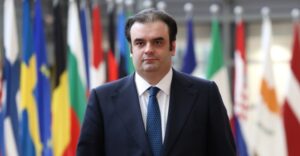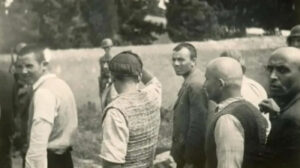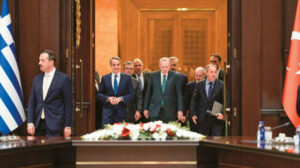At a meeting with Albania’s President, Ilir Meta, on Wednesday in Pristina, Kosovo President Hashim Thaci asked Tirana to offer Kosovo citizens Albanian citizenship, to help them escape their current “isolation” from the European Union.
Complaining that the EU had left Kosovo in “circumstances of classic isolation”, Thaci said that the only hope “at this moment for the free movement of Kosovo citizens … lies in granting Albanian citizenship to Kosovo citizens”.
The Albanian President, however, gave the idea short shrift and urged instead Kosovo to focus on resolving its vexed border demarcation agreement with Montenegro, which the EU has named as one of the keys to visa liberalisation.
While Meta said that he understood Thaci’s demand and also “what is happening to Albanians from Kosovo … the solution is not for all citizens of Kosovo to be granted citizenship [of Albania] … The solution is to pass the demarcation [agreement]”.
Kosovo Prime Minister Ramush Haradinaj meanwhile sounded more positive about visa liberalisation, saying that the new government was doing its job and not losing time.
“I do not think we are hopeless when it comes to [visa] liberalisation, though I am not against granting [Albanian] citizenship [to Kosovars],” he told BIRN.
A BIRN investigation revealed that the number of foreigners – mostly from Kosovo – who gained Albanian citizenship based on the criteria of “special interest” has risen since 2011, which is when Albanians obtained the right to visa-free travel to the EU.
The award of citizenship to six Kosovo politicians in 2016 triggered a debate in Albania over the President’s discretionary right to hand out these important privileges.
Former Albania Prime Minister Sali Berisha, back in 2012, alluded to the possibility of extending Albanian citizenship to Kosovo citizens. But this was quickly taken off the table.
Kosovo proclaimed independence in 2008 but its statehood remains contested by Serbia and is not recognised by five EU member states. Partly because of the status issue, Kosovo nationals are now the only ones in the Balkans who still need visas to travel to the EU’s passport-free Schengen area.
The European Commission recommended that Kosovo should be transferred to the visa-free list for short stays in the Schengen zone in May 2016.
But the Commission also said that Kosovo needed to step up its efforts to tackle organised crime and corruption and ratify a border demarcation agreement with Montenegro.
Parliament in Kosovo has yet to do this, following street protests against the deal that ended in clashes with police in Pristina.
Former Kosovo Prime Minister Isa Mustafa left office after losing a confidence vote in parliament related to the border issue. His opponents and some other experts claimed that Kosovo stood to lose territory under the terms of the deal.
Source: balkaninsight.com
Ask me anything
Explore related questions





